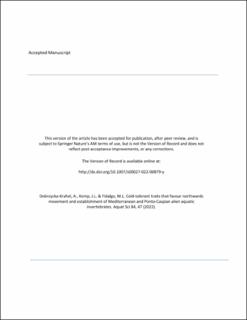| dc.description.abstract | Over recent decades, many Mediterranean and Ponto-Caspian aquatic invertebrate species have dispersed northwards and established as non-native species in colder regions. We hypothesized that these species have cold-tolerant traits, which facilitate dispersal into colder climates. Thanks to these traits, Southern European aquatic species are able to cross biogeographic boundaries. We downloaded the list of all alien invertebrate species that were fully aquatic (i.e. lacking terrestrial adults) from the GRIIS database and picked out those Mediterranean and Ponto-Caspian species that have undergone northwards range expansion. We identified traits that may facilitate dispersal to colder climates including the following: small size; capacity for behavioural thermoregulation; feeding habit (omnivorous, filter-feeders, food generalists); quiescence and dormancy (or diapause); freezing avoidance (presence of cryoprotectants); tolerance to low temperatures or eurythermicity; active dispersal; and enhanced reproduction. We statistically tested the null hypotheses that Mediterranean and Ponto-Caspian alien aquatic invertebrate species that dispersed into the north have all of these traits. We used contingency tables populated with raw frequency data with χ2—tests and assessed statistical significance at α of 0.05. We identified 95 Mediterranean and Ponto-Caspian alien aquatic invertebrate species that have shown northwards range extension, 10 (10%) of which were of Mediterranean origin and 85 (90%) of Ponto-Caspian origin. We found that this northwards dispersal from Southern Europe is mainly limited to a few following groups of aquatic invertebrates: small crustaceans, molluscs, cnidarians and annelids. Ability to go to diapause, hibernation or resting period, temperature tolerance and small size were the traits most commonly shared by these organisms. We conclude that Mediterranean and Ponto-Caspian aquatic invertebrate species showing northwards range expansion have cold-tolerant strategies. The traits analysed can favour the establishment of the species. | en_US |
